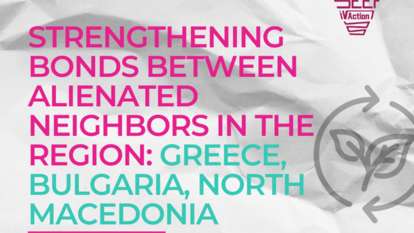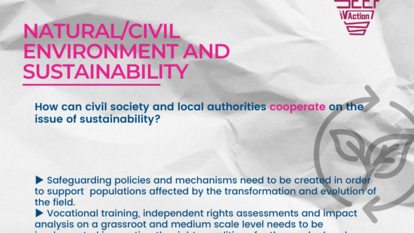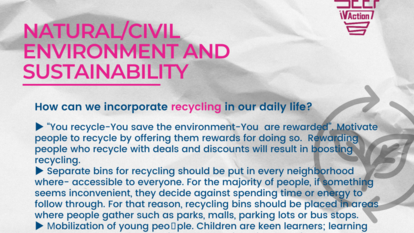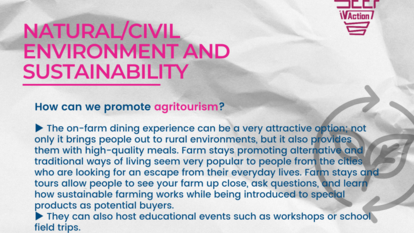Regional Cooperation
ΙΙΙ. Youth Cooperation Without Borders

An increasing interest and concern is raising over the last years about the environment and the climate crisis. Young people, activists, and politicians at various ranks in the political spectrum advocate for sustainable solutions and re-organization of our way of living. Last year, the invasion in Ukraine caused an energy crisis in Europe and made the need for change more obvious than ever before.
The complexity of the issue makes the action and solution challenging. On the one hand, experts are concerned and advocate about environmental protection and preservation of natural resources. Species and ecosystem, food security, and energy choices are some of the pressing topics. However, the agenda includes also the way that individuals live and function in society. The shift towards sustainable solutions, rural development, smart cities, and alternative start-up environmentally friendly initiatives are high on the agenda.
In an effort to achieve cooperation and common action at a trilateral level, the organization SEE in Action, with the support of the Friedrich Naumann Foundation for Freedom Greece and Cyprus, undertook the third part of the project “Strengthening bonds between alienated neighbors in the region: Greece, Bulgaria, North Macedonia”, with the topic natural/ civil environment and sustainability.
In this sense, the last issue that has been discussed and gains more and more attention over the last years is sustainability and the environment. Young people in the region are highly concerned about climate change and the policy recommendations in that direction. More precisely, they highlight the necessity for more knowledge, trainings, and action toward green cities, support mechanisms for startups and rural areas, and agriculture.
As participants have highlighted, sustainability and human rights are interconnected and complementary to each other. CSOs need to further engage in promoting this interconnection and avoid the dissociation of the two. Hence, prohibitions and bans are not suitable solutions for such an issue. At all societal levels, there should be a shared understanding and course of action. As a result, the process of becoming sustainable should also be community- and region-centered, with an emphasis on specialization, specialized research, and the collecting and use of data that will address both human rights issues and the Sustainable Development Goals (SDGs).
Indicative proposals:
CSOs participated in the event suggest:
- Safeguarding policies and mechanisms need to be created in order to support populations affected by the transformation and evolution of the field.
- Civil society and local authorities can cooperate through mutual campaigning, training, and approaching local communities in order to inform them and promote the benefits of being sustainable while actively and openly supporting the transition to a circular economy and protecting and improving the quality of natural resources, including air, soil, and water among others.
- Social entrepreneurship and young businesspersons in agriculture must be supported. Training, seminars, and access to experts should be provided by local and state authorities in cooperation with CSOs. The evolution of agriculture must look to the future with respect to the needs of the environment and society, without overlooking and overpassing the older generations of farmers and agriculture workers of all kinds.
- Civil Society should engage in continuous and productive lobbying and advocacy in favor of the country’s implementation process of the aforementioned policies and strategies.
Analysts and activists on the issue recommend various alternatives to deal with the topic. The solution comes from the triangle government- economy – individuals. Governments should formulate the environment and incentives for entrepreneurs and businesses to be more sustainable and innovative and also individuals be aware of the issue, advocate and change their old habits.
In these pressing circumstances, politicians and activists should always consider that environmental issues, such as climate change, air and water pollution, and the loss of biodiversity, can be a risk to people’s lives, or at least jeopardize their livelihoods. No one should be left vulnerable to the environmental consequences of our economic actions. For that reason, the environmental policies should be addressed for the people and not against them.




Suggested Trilateral Initiatives
⇢ City-twinnings
The three respective countries share common geographical features (mountains, rivers, and lakes). Regional cooperation could prove to be the key to many regional issues. Thus, organizations should encourage local authorities to come closer with their similar neighbors in order to create step-by-step the right conditions for implementing actions and policies towards creating a sustainable natural environment as well as sustainable channels and bridges of regional cooperation and communication.
Disclaimer
The article was written by Eleni Siapikoudi, Project Assistant of FNF Greece & Cyprus, based on the final policy recommendations of the project.
The project “Strengthening bonds between alienated neighbors in the region: Greece, Bulgaria, North Macedonia” was made possible with the support of the Friedrich Naumann Foundation for Freedom. Views and opinions expressed in this paper are those of the author(s) only and do not necessarily reflect those of the Friedrich Naumann Foundation.
